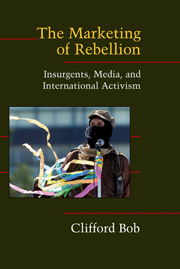Book contents
- Frontmatter
- Contents
- Maps and Tables
- Acknowledgments
- The Marketing of Rebellion
- 1 INSURGENT GROUPS AND THE QUEST FOR OVERSEAS SUPPORT
- 2 POWER, EXCHANGE, AND MARKETING
- 3 FROM ETHNIC TO ENVIRONMENTAL CONFLICT: NIGERIA'S OGONI MOVEMENT
- 4 THE MAKING OF AN ANTIGLOBALIZATION ICON: MEXICO'S ZAPATISTA UPRISING
- 5 TRANSNATIONAL MARKETING AND WORLD POLITICS
- APPENDIX 1 NGO STANDARDS FOR SUPPORTING LOCAL MOVEMENTS
- APPENDIX 2 INTERVIEWS
- Bibliography
- Index
3 - FROM ETHNIC TO ENVIRONMENTAL CONFLICT: NIGERIA'S OGONI MOVEMENT
Published online by Cambridge University Press: 24 May 2010
- Frontmatter
- Contents
- Maps and Tables
- Acknowledgments
- The Marketing of Rebellion
- 1 INSURGENT GROUPS AND THE QUEST FOR OVERSEAS SUPPORT
- 2 POWER, EXCHANGE, AND MARKETING
- 3 FROM ETHNIC TO ENVIRONMENTAL CONFLICT: NIGERIA'S OGONI MOVEMENT
- 4 THE MAKING OF AN ANTIGLOBALIZATION ICON: MEXICO'S ZAPATISTA UPRISING
- 5 TRANSNATIONAL MARKETING AND WORLD POLITICS
- APPENDIX 1 NGO STANDARDS FOR SUPPORTING LOCAL MOVEMENTS
- APPENDIX 2 INTERVIEWS
- Bibliography
- Index
Summary
In the summer of 1995, in a stifling courtroom in Port Harcourt, Nigeria, Ken Saro-Wiwa and nine other members of the Movement for the Survival of the Ogoni People (MOSOP) stood on trial for their lives. Led by Saro-Wiwa, MOSOP had for five years sought political autonomy for the Ogoni minority group while protesting ethnic discrimination, economic exploitation, and environmental destruction by the Nigerian government and Royal Dutch/Shell, the major oil producer in the region. Now, accused on flimsy evidence of incitement to murder four rival leaders, the MOSOP members faced a military tribunal hand-picked by the country's brutal dictator, General Sani Abacha. As the kangaroo court plodded forward that summer, MOSOP members, supported by major NGOs, fanned out to world capitals. Enlisting heads of state from Bill Clinton to Nelson Mandela to John Major, the Ogoni network pressured the Nigerian government but to no avail. On November 10, 1995, only days after the tribunal's long-predicted guilty verdict, Saro-Wiwa and eight others were marched to the gallows and their bodies dumped in unmarked graves.
Saro-Wiwa's killing was a severe blow to the Ogoni. But in a few short years, the man and his small movement had scored remarkable successes on the international stage against one of the world's most repressive governments and one of its largest corporations. Most basically, MOSOP lifted the Ogoni out of historical anonymity to widespread support.
- Type
- Chapter
- Information
- The Marketing of RebellionInsurgents, Media, and International Activism, pp. 54 - 116Publisher: Cambridge University PressPrint publication year: 2005
- 1
- Cited by

